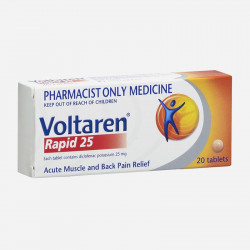Voltaren (diclofenac) Coupons, Discounts & Cost
Voltaren contains diclofenac sodium. One way to save money on the Voltaren retail cost regardless of income and insurance status is to use Voltaren coupons or discount cards from RXCoupons. Use this Diclofenac coupon at this online pharmacy and receive up to 75% off the sale price.
How does Voltaren work?
Voltaren contains diclofenac sodium. This component of non-steroidal structure has a pronounced anti-inflammatory, analgesic and antipyretic effect.
Diclofenac is often used in the treatment of patients suffering from rheumatic diseases. This drug will be effective in case of pain, morning stiffness and swelling of the joints. Voltaren relieves pain and reduces inflammatory edema in post-traumatic and post-operative inflammation. It is also used to treat moderate and severe pain of non-rheumatic origin (migraine attacks). Also, diclofenac can reduce pain and reduce blood loss in primary dysmenorrhea.
Diclofenac in the form of tablets is completely absorbed from the intestine.
What are the possible indications for Voltaren?
- Inflammatory diseases of the musculoskeletal system: rheumatoid arthritis, ankylosing spondylitis, osteoarthritis, juvenile rheumatoid arthritis; - Diseases of the spine accompanied by pain syndrome; - Some extra-articular rheumatic disorders; - Acute attack of gout; - Renal and biliary colic (diclofenac for intravenous administration); - Post-traumatic and postoperative pain syndromes accompanied by edema; - Gynecological diseases accompanied by pain syndrome and inflammation (for example, primary dysmenorrhea); - Severe infectious and inflammatory diseases of the ear, throat and nose (for example, pain in case of pharyngitis, tonsillitis, otitis). - Migraine attacks.
What is the usual dosage of Voltaren?
Voltaren tablets
Voltaren tablets should be swallowed whole with water, preferably before meals.
As for adults, the recommended initial dose is 100-150 mg per day. 75-100 mg per day is sufficient in relatively mild cases of the disease. The daily dose should be divided into several doses. The total daily dose should not exceed 150 mg.
As for primary dysmenorrhea, the daily dose is selected individually (50-150 mg). The drug should be taken when the first symptoms appear.
Voltaren suppositories
The recommended initial dose for adults is 100-150 mg per day. 75-100 mg per day is sufficient in relatively mild cases of the disease. Suppositories are used before bedtime. The total daily dose should not exceed 150 mg.
As for migraine attack, the initial dose is 100 mg.
Voltaren solution for injection
Voltaren is injected in the buttock area. Do not use Voltaren injections for more than 2 consecutive days. If necessary, treatment can be continued with Voltaren tablets or suppositories.
The usual dose is 75 mg (1 ampoule) 1 time per day. In severe cases (for example, renal colic), 2 injections of 75 mg are recommended with an interval of several hours. Alternatively, one injection per day (75 mg) can be combined with other dosage forms (tablets, suppositories).
What are the side effects of Voltaren?
Digestive system: pain in the epigastric region, nausea, vomiting, diarrhea, abdominal cramps, dyspepsia, flatulence, anorexia; rarely - gastrointestinal bleeding, gastric and intestinal ulcers, hepatitis, glossitis, nonspecific hemorrhagic colitis, ulcerative colitis or Crohn's disease, constipation, pancreatitis.
CNS: headache, dizziness; rarely - drowsiness, paresthesia, memory disorders, disorientation, insomnia, irritability, convulsions, depression, anxiety, nightmares, tremors.
Cardiovascular system: in some cases - chest pain, high blood pressure.
Dermatological reactions: skin rash; rarely - hives, eczema, erythema multiforme, Stevens-Johnson syndrome, Lyell's syndrome, hair loss, photosensitivity reactions.
Urinary system: rarely - edema, acute renal failure, hematuria, proteinuria, interstitial nephritis, nephrotic syndrome, papillary necrosis.
Hematopoietic system: thrombocytopenia, leukopenia, hemolytic anemia, aplastic anemia, agranulocytosis.
Hypersensitivity reactions: rarely - bronchospasm, arterial hypotension, vasculitis, pneumonitis.
Other reactions: visual impairment (blurred vision, diplopia), hearing impairment, tinnitus, taste disorders.
What are the contraindications for Voltaren?
Voltaren is contraindicated in case of ulcer of the stomach, asthma attacks, hives, hypersensitivity to diclofenac and any other ingredients of the drug.
The drug is not recommended for use in the third trimester of pregnancy and in children under 18 years of age.
Medical supervision is recommended for those patients who have ulcerative lesions of the stomach or intestines, ulcerative colitis or Crohn's disease, as well as for those with impaired liver function.
Special care is required in the treatment of patients with cardiac or renal dysfunction, patients receiving diuretics, as well as patients after surgical interventions. Monitoring of renal function is recommended in these cases.
Caution should be exercised when using Voltaren in elderly patients, patients with bronchial asthma.
What should you know about Voltaren interactions
?
Voltaren can increase the concentration of lithium and digoxin.
Just like other NSAIDs, Voltaren can reduce the effect of diuretics. Combination therapy with other NSAIDs will increase the risk of side effects.
It is recommended to closely monitor patients using Voltaren and anticoagulants.

